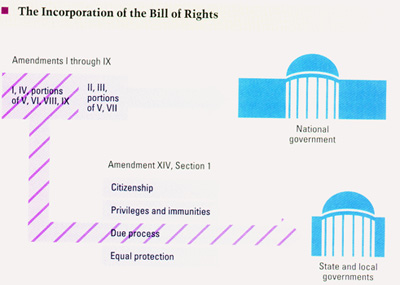II. Privileges and Immunities of Citizens
- Basic rights enjoyed by all citizens; must meet two tests:
- right conferred by the federal Constitution or federal law
- right enjoyed solely because one is a citizen, and not enjoyed by non-citizens.
- Privileges and Immunities include (but not limited to):
- right to become a citizen of a state;
- right to settle on a homestead on federal land;
- right to take a U. S. Civil Service Examination;
- right to vote in federal elections.
III. Selective Incorporation & the Due Process Clause
Selective Incorporation is the process used by the Supreme Court to apply selected portions of the Bill of Rights to the States.

- Palko v. Connecticut, 302 U.S. 319 (1937):
- fundamental rights: freedom of thought and speech (1ST amendment rights) are absorbed by the 14th Amendment's due process clause, and applicable to the states.
- other rights (i.e., trial by jury, etc.) are not essential to liberty, and are not absorbed by the due process clause and are not applicable to the states
- Wolf v. Colorado, 338 U.S. 225 (1949): 4th Amendment (unreasonable search & seizure)
- Miranda v. Arizona, 384 U.S. 486 (1966): 5th Amendment (self-incrimination):
- Gideon v. Wainwright, 372 U.S. 335 (1963): 6th Amendment (assistance of counsel)
- 9th Amendment: Rights Not Specifically Listed in the Bill of Rights
- Griswold v. Connecticut, 381 U.S. 479 (1965);
- Roe v. Wade, 410 U.S. 113 (1973)
IV. Equal Protection of the Law
- History & Purpose
- General protection form all forms of arbitrary classification and discrimination;
-
"without fair, solid, and substantial cause; not governed by any fixed rules or standard."
(See Black's Law Dictionary, p. 134). - Principles of Valid Classification: If the law places people into different classes, then:
- the classes must differ from each other;
- classification must have some rational connection to the purpose of the law.
- Age is an appropriate classification with respect to:
- right to vote;
- drive an automobile;
- attend public schools.
- Age is an inappropriate classification to determine:
- who may own property;
- who is liable to pay property taxes.
- Brown v. Board of Education, 347 U.S. 483 (1954).
- "Separate but equal" has no place in our public institutions".
- recognized individual dignity as a constitutional value protected by the equal protection clause.
- Romer v. Evans, 512 U.S. 620 (1996)
- State laws must be based on rational relationship to legitimate state interests.
- equal protection is based on the principle that government remains open & impartial to all who seek its assistance.
- a strong dislike of a unpopular group, or a desire to harm a politically unpopular group connot constitute a legitimate governmental interest.
- Adopted to prevent subjecting former slaves to discriminatory
laws and regulations
| Top of Page | BACK to the POSC100 Home Page |